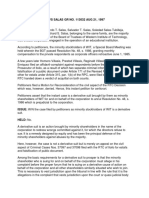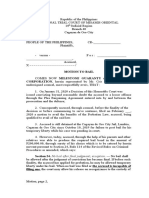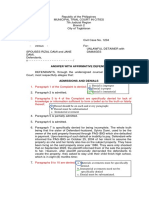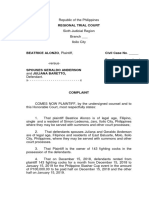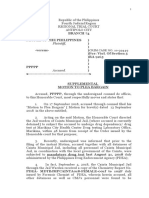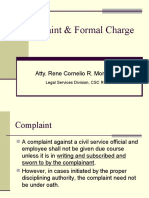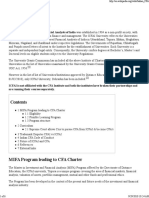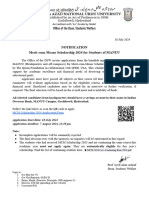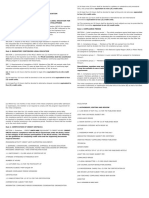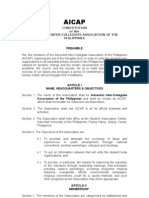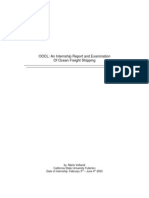The Administrative Disciplinary Process in The Philippine Civil Service
The Administrative Disciplinary Process in The Philippine Civil Service
Uploaded by
Ymer VTCopyright:
Available Formats
The Administrative Disciplinary Process in The Philippine Civil Service
The Administrative Disciplinary Process in The Philippine Civil Service
Uploaded by
Ymer VTOriginal Description:
Original Title
Copyright
Available Formats
Share this document
Did you find this document useful?
Is this content inappropriate?
Copyright:
Available Formats
The Administrative Disciplinary Process in The Philippine Civil Service
The Administrative Disciplinary Process in The Philippine Civil Service
Uploaded by
Ymer VTCopyright:
Available Formats
The Administrative Disciplinary Process in
the Philippine Civil Service
Transcript
1. The Administrative Disciplinary Process
2. Objective ADMINISTRATIVE Maintenance of discipline in the public service.
3. Nature Not adversarial
4. Powers Used in Investigations Interrogation of Witnesses Swearing of Witnesses Issuance
of Subpoena Inspection of Premises
5. Commencement of Administrative Proceedings Administrative proceedings may be
commenced against a subordinate officer or employee by the Secretary or head of office of
equivalent rank, or head of local government, or chiefs of agencies, or regional directors, or
upon sworn, written complaint by any other person. Sec. 48 (1), Chapter 6, Subtitle A, Title
I, Book V of EO 292 (Administrative Code of 1987)
6. head of agency (show cause order Any person (aka citizens complaint)
7. CSC Resolution No. 1101502 November 8, 2011
8. Under oath In writing In triplicate copies (n) COMPLAINT If there is more than 1 person
complained of, the complainant is required to submit additional copies corresponding to the
number of persons complained of. (n)
9. Certification of non-forum shopping Certified copy of documentary evidence and affidavits
of witnesses Narration of relevant and material facts Full name and address of person/s
complained of; position/s; and, office/s Full name and address of the complainant
10. Anonymous Complaint
11. Withdrawal of Complaint Does not result in its outright dismissal Nor discharge the
person complained of (PCO) from any administrative liability
12. Action on the Complaint Complaint sufficient in form and substance PCO to submit
COUNTER AFFIDAVIT/COMMENT under oath Within 3 days from receipt of the Order.
13. Stages Preliminary Investigation Formal Investigation Appeal
14. Purpose of the Investigation To ascertain the truth without necessarily adhering to
technical rules applicable in judicial proceedings.
15. Who conducts the Investigation? Disciplining authority Authorized representative
16. LGUs person committee Duly authorized by the Local Chief Executive
17. Role of the Person/Committee does not sit as a judge but only as a fact-finder.
18. Preliminary Investigation Inquiry or proceeding undertaken to determine the existence of
prima facie case to warrant the issuance of a formal charge
19. Purpose of Preliminary Investigation To secure the innocent against hasty, malicious and
oppressive prosecutions. To protect him from open and public accusation of crime, from the
trouble, expenses and anxiety of a public trial To protect the State from useless and
expensive prosecutions.* For the disciplining authority to determine whether a prima facie
case exists to warrant the issuance of a formal charge.
20. At first sight On the face of it At first view On first appearance absent other information or
evidence
21. Duration of PI shall commence not later than 5 days from receipt of the complaint shall
be terminated within 20 days thereafter
22. Submitted within 5 days from the termination of the PI
23. Specification of charge(s) A brief statement of material or relevant facts with certified true
copies of the documentary evidence, if any Sworn statements of testimony of witnesses
Formal Charge the A directive to answer the charge (s) in writing under oath in not less than
seventy-two (72) hours from receipt thereof An advice to indicate in the answer whether or
not he/she elects a formal investigation a notice that he/she may opt (n) to be assisted by a
counsel of his/her choice.
24. Notice of Charge/s issued in instances when the complaint was initiated other than the
disciplining authority (n)
25. Notice of Charge/s charge/s against the PCO with a statement that a prima facie case
exists directive to answer the charge/s in writing, under oath in not less than 72 hours from
receipt thereof notice that he/she may opt to be assisted by a counsel of his/her choice With
the following attachments the complaint sworn statement other documents submitted
26. Prohibited Pleadings requests for clarification motions to dismiss bills of particulars
motions to quash motions for reconsideration
27. Answer in writing under oath specific shall contain material facts and applicable laws, if
any includes documentary evidence, sworn statements of witnesses
28. Purpose To prevent the respondent from exerting undue influence or pressure on the
witnesses against him/her tampering with evidence that may be used against him/her
29. Preventive Suspension may issue if the charge involves the following offenses:
Dishonesty Grave Misconduct Oppression Neglect in the Performance of Duty Administrative
offenses which are punishable by dismissal from the service on its second or third offense. If
there are reasons to believe that the respondent is guilty of charges which would warrant
his/her removal from the service.
30. In lieu of preventive suspension reassignment During formal hearings
31. Kinds of Preventive Suspension Preventive Suspension Pending Investigation Preventive
Suspension Pending Appeal
32. Preventive Suspension Pending Investigation NOT a penalty
33. Duration Maximum of 90 days for employees of the NGAs, SUCs, and GOCCs. 60 days
for employees of the LGUs
34. Automatic reinstatement follows after the lapse or expiration of the period.
35. If respondent is on authorized leave preventive suspension shall be deferred or
interrupted until such time that said leave has been fully exhausted.
36. Remedy from the Order of Preventive Suspension Appeal to the Commission MR is not
allowed.
37. Payment of Back Salaries During Preventive Suspension Declaration by the Commission
that an order of preventive suspension is null and void on its face
38. Null and Void on its Face The order was issued by one who is not authorized by law. The
order was not premised on any of the conditions under Sec 26 (A and B) of the RRACCS.
39. The order of preventive suspension was issued without a formal charge or notice of
charges
40. While lawful in the sense that it is based on the enumerated grounds, the duration of the
imposed preventive suspension has exceeded the prescribed periods.
41. If the official or concerned is exonerated employee fully of the charge/s or when the
penalty imposed in the principal case is reprimand (n), he or she shall be paid such back
salaries.
42. Full Exoneration A finding of for the offense/s charged. Downgrading of the charge to a
lesser offense shall not be construed as full exoneration.
43. Preventive Suspension Pending Appeal NOT stop the decision from being EXECUTORY.
An appeal shall
44. In case the penalty is suspension or removal, the respondent shall be considered as
having been under PREVENTIVE SUSPENSION during the pendency of the appeal in the
event he wins the appeal
45. Preventive Suspension Pending Appeal Actually punitive
46. Effect of Exoneration Reinstatement with Full Pay for the period of suspension.
47. Effect of Affirmation of Conviction The period of suspension becomes part of the final
penalty of suspension or dismissal.
48. Formal when the merits of the case cannot be decided judiciously without conducting
such investigation when the respondent elects to have one
49. Period of Investigation Not earlier than 5 days nor later than 10 days from the date of
receipt of Answer Shall be finished within 30 days from the filing of the charges Unless the
period is extended by the disciplining authority in meritorious cases
50. Submission of Position Paper/Memorandum at any stage of the proceedings based on
the mutual consent of the parties submit the case for resolution without any need for further
hearings (n)
51. Pre-Hearing Conference mandatory done at the commencement of the formal
investigation
52. Matters that will be considered and agreed upon by the parties during the PHC
Stipulation of facts Simplification of issues Limiting the number of witnesses, and their names
Dates of subsequent hearings Identification and marking of evidence of the parties Such
other matters as may aid in the prompt and just resolution of the case. Waiver of objections
to admissibility of evidence
53. Agreement during the PHC binding on both parties
54. How do you conduct hearings? Call the case Appearance of counsel Take note of the
order of hearing Take note
55. Resolve objections Resolve oral motions Adjourn
56. Hearings conducted on the hearing dates set by the Hearing Officer OR as agreed upon
during the pre-hearing conference
57. Postponement A party shall be granted one (1) (n) postponement upon Oral or Written
request
58. Order of Hearing prosecution respondent Presentation of rebuttal/surrebuttal evidence
unless the hearing officer directs otherwise
59. Formal Investigation Report Shall be submitted to the disciplining authority within 15 days
after the conclusion of the formal investigation.
60. Contents of Report Narration of the material facts established during the investigation
Findings and evidence supporting said findings Recommendations
61. Disciplining Authority Renders decision within 30 days from receipt of the Report of
Investigation
62. Decision Finding of facts evidence to support the finding or conclusion evidence must be
substantial
63. SUBSTANTIAL EVIDENCE Such relevant evidence as a reasonable mind might accept
as adequate to support a conclusion.
64. Settlement in Administrative Cases Light Offenses Act is purely personal on the part of
the private complainant and person complained of There is no apparent injury committed to
the government.
65. Offenses which may be the subject of settlement and/or compromise Borrowing money
by superior officers from subordinates Willful failure to pay just debts
66. Simple Misconduct resulting from misunderstanding/fight between the respondent and
complainant provided the act is not committed within office premises Discourtesy in the
course of official duties Other analogous circumstances/cases
67. Aide Memoire Administrative investigations shall be conducted without necessarily
adhering strictly to the technical rules of procedure and evidence applicable to judicial
proceedings.
68. End of Session
You might also like
- Sbi Assets & Liabilities FormatDocument1 pageSbi Assets & Liabilities FormatDip Borah88% (8)
- Sample Board ResolutionDocument3 pagesSample Board ResolutionYmer VT100% (1)
- Everyday StalinismDocument22 pagesEveryday Stalinismamru56No ratings yet
- SK AccountabilityDocument92 pagesSK AccountabilityCezar Miralles Tirol IINo ratings yet
- Cudia Case BrieferDocument11 pagesCudia Case BrieferLacab ShierlyNo ratings yet
- Judicial AffidavitDocument3 pagesJudicial AffidavitMark John OrtencioNo ratings yet
- Term Paper in Legal CounsellingDocument15 pagesTerm Paper in Legal Counsellingfe rose sindinganNo ratings yet
- Motion To Discharge Accused Fro Inpatient Rehab - HernaneDocument3 pagesMotion To Discharge Accused Fro Inpatient Rehab - HernaneJeddox La ZagaNo ratings yet
- Zari Vs FloresDocument8 pagesZari Vs Floresrafaelturtle_ninjaNo ratings yet
- Supreme Court: Plaintiff-AppellantDocument3 pagesSupreme Court: Plaintiff-AppellantMa. Danice Angela Balde-BarcomaNo ratings yet
- #1 (Stanfilco) Dole Philippines, Inc., Petitioner, vs. Reynaldo B. Rodriguez and Liborio Africa, Respondents.Document17 pages#1 (Stanfilco) Dole Philippines, Inc., Petitioner, vs. Reynaldo B. Rodriguez and Liborio Africa, Respondents.supergarshaNo ratings yet
- Terceria CaseDocument9 pagesTerceria CaseGabriel SollanoNo ratings yet
- Plaintiff,: Republic of The Philippines Regional Trial Court Branch - ,, Civil Case No.Document5 pagesPlaintiff,: Republic of The Philippines Regional Trial Court Branch - ,, Civil Case No.Elaiza HilasgueNo ratings yet
- Complaint For Sum of MoneyDocument4 pagesComplaint For Sum of MoneyEd ApallaNo ratings yet
- Affidavit of Loss - CR of MotorcycleDocument1 pageAffidavit of Loss - CR of MotorcycleJholo AlvaradoNo ratings yet
- Data Privacy Act Form 1Document1 pageData Privacy Act Form 1Irene ToNo ratings yet
- Appellees BriefDocument11 pagesAppellees BriefEijnas RatilcNo ratings yet
- Annulment BlankDocument2 pagesAnnulment BlankFox Briones AlfonsoNo ratings yet
- A.M. No. 07-8-2-SC Rule On Children Charged With 9165Document32 pagesA.M. No. 07-8-2-SC Rule On Children Charged With 9165Dbee Dvee100% (1)
- Memorandum Annulment - Google SearchDocument2 pagesMemorandum Annulment - Google SearchSarah Jane-Shae O. SemblanteNo ratings yet
- Motion For Recon NavidadDocument6 pagesMotion For Recon NavidadDence Cris RondonNo ratings yet
- Western Institute Vs Salas GR No. 113032 Aug 21, 1997 FactsDocument5 pagesWestern Institute Vs Salas GR No. 113032 Aug 21, 1997 FactsJenNo ratings yet
- Ipcr DojDocument2 pagesIpcr DojzlljsriwNo ratings yet
- Katarungan Pambarangay Law Sec 410Document1 pageKatarungan Pambarangay Law Sec 410Dan CruzNo ratings yet
- RHEA Affidavit ComplaintDocument3 pagesRHEA Affidavit ComplaintMara Lacsamana0% (1)
- Pretrial On DefenseupDocument5 pagesPretrial On Defenseup安美仁No ratings yet
- Counteraffidavit PREZELDocument3 pagesCounteraffidavit PREZELjamesNo ratings yet
- Motion To Bail: CORPORATION, Herein Represented by Mr. Cris Talili, Through TheDocument2 pagesMotion To Bail: CORPORATION, Herein Represented by Mr. Cris Talili, Through TheJudel CarmonaNo ratings yet
- BAR MATTER 1153 Estelito MendozaDocument21 pagesBAR MATTER 1153 Estelito MendozaSamiha TorrecampoNo ratings yet
- Summons: BFAR 7, Represented by JOSEFINA D. Flores, Administrative Case NoDocument6 pagesSummons: BFAR 7, Represented by JOSEFINA D. Flores, Administrative Case NoFulgencio Dos PalosNo ratings yet
- Position Paper Ronquillo vs. WheeltekDocument5 pagesPosition Paper Ronquillo vs. Wheeltekviolaine wycocoNo ratings yet
- Reply To ComplaintDocument4 pagesReply To ComplaintWella JaneNo ratings yet
- Accion InterdictalDocument3 pagesAccion InterdictalFLORENCIO jr LiongNo ratings yet
- Appeal Final EditDocument21 pagesAppeal Final EditEarl Ian DebalucosNo ratings yet
- Art. 806Document24 pagesArt. 806Joy OrenaNo ratings yet
- Petition For Certiorari and Prohibition Against Republic Act 10354 (RH) by PAXDocument41 pagesPetition For Certiorari and Prohibition Against Republic Act 10354 (RH) by PAXCBCP for Life100% (2)
- Dishonesty Suspension2Document120 pagesDishonesty Suspension2Melvin PernezNo ratings yet
- Undertaking Exigency of ServiceDocument1 pageUndertaking Exigency of ServicePrana ReneeNo ratings yet
- Zed Collection of Sum of MoneyDocument4 pagesZed Collection of Sum of MoneyIsidore Tarol IIINo ratings yet
- DPRM Form Esd 03 A Revised 2017Document2 pagesDPRM Form Esd 03 A Revised 2017ericson almerez100% (1)
- Admisnitrative Complaint - LegitimasDocument3 pagesAdmisnitrative Complaint - LegitimasAleks OpsNo ratings yet
- Brief For The AppelleeDocument25 pagesBrief For The AppelleeAntonio de VeraNo ratings yet
- Wood Technology Corp v. Equitable Bank G.R. 153867Document6 pagesWood Technology Corp v. Equitable Bank G.R. 153867Dino Bernard LapitanNo ratings yet
- CBF 9 Request For Subpoena Duces Tecum Ad TestificandumDocument5 pagesCBF 9 Request For Subpoena Duces Tecum Ad TestificandumAndro DayaoNo ratings yet
- Motion For Issuance of Break Opne OrderDocument2 pagesMotion For Issuance of Break Opne OrderErdna Leugim NoerracNo ratings yet
- Spa SampleDocument2 pagesSpa SampleJoyce BalinoNo ratings yet
- Writ of Preliminary Injuction/Tro China Banking Corporation vs. Ciriaco G.R. No. 170038 July 11, 2012Document5 pagesWrit of Preliminary Injuction/Tro China Banking Corporation vs. Ciriaco G.R. No. 170038 July 11, 2012RRNo ratings yet
- Plaridel-Surety-GR-183128-Mar-20-2017 Full TextDocument8 pagesPlaridel-Surety-GR-183128-Mar-20-2017 Full TextC SNo ratings yet
- A.M. No. 03-04-04-SCDocument5 pagesA.M. No. 03-04-04-SCGodofredo SabadoNo ratings yet
- Ejectment AnswerDocument4 pagesEjectment AnswerSkull RIDER 69No ratings yet
- JA Petitioner Estrella Pacr Court 2Document8 pagesJA Petitioner Estrella Pacr Court 2Socorro Tuzon VerzosaNo ratings yet
- Application For Attorney III (Deped)Document23 pagesApplication For Attorney III (Deped)Bryan Gai IdmilaoNo ratings yet
- Answer RapeDocument3 pagesAnswer RapeArkhe PlazaNo ratings yet
- RA 9048 RA 10172 FormDocument6 pagesRA 9048 RA 10172 FormCharles Melvin Sumi-ogNo ratings yet
- ComplaintDocument4 pagesComplaintjovy janeNo ratings yet
- Branch 74 People of The Philippines) ) ) - Versus-) ) For: Viol. of Section 5) RA 9165) ) PPPPP) ) X - XDocument2 pagesBranch 74 People of The Philippines) ) ) - Versus-) ) For: Viol. of Section 5) RA 9165) ) PPPPP) ) X - XMc GoNo ratings yet
- Complaint: Regional Trial Court Branch 69Document5 pagesComplaint: Regional Trial Court Branch 69Ma Krissa Ellaine BundangNo ratings yet
- Report Preliminary Evaluation For Complaint Referred To PI InquestDocument1 pageReport Preliminary Evaluation For Complaint Referred To PI Inquestmakicatapang23No ratings yet
- Arambulo vs. GungabDocument3 pagesArambulo vs. GungabEzi AngelesNo ratings yet
- Letter RequestDocument1 pageLetter Requestgeno_moscardonNo ratings yet
- Revised Rules On Administrative Cases in The Civil ServiceDocument18 pagesRevised Rules On Administrative Cases in The Civil ServiceDara Mitzi Pinili LindicoNo ratings yet
- Complaint & Formal ChargeDocument21 pagesComplaint & Formal ChargeDiana Sia VillamorNo ratings yet
- Mapeh Dept ActivityDocument4 pagesMapeh Dept Activitygloria tolentinoNo ratings yet
- MRF Moa SigningDocument2 pagesMRF Moa SigningYmer VTNo ratings yet
- Sample Computation of Retirement PayDocument1 pageSample Computation of Retirement PayYmer VTNo ratings yet
- (Hubert Web Case) Lejano vs. People of The PhilippinesDocument107 pages(Hubert Web Case) Lejano vs. People of The PhilippinesYmer VTNo ratings yet
- Alien Employment Permit FormDocument2 pagesAlien Employment Permit FormYmer VTNo ratings yet
- Final Memorandum Submitted To The Court of Appeals in The Habeas Corpus PetitionDocument54 pagesFinal Memorandum Submitted To The Court of Appeals in The Habeas Corpus PetitionYmer VT100% (1)
- Indian CFA - Wikipedia, The.Document6 pagesIndian CFA - Wikipedia, The.srinivasbiotechNo ratings yet
- ANSW BAR QDocument15 pagesANSW BAR Qdave valcarcelNo ratings yet
- Philippine Military History - ROTC - Activity #2Document10 pagesPhilippine Military History - ROTC - Activity #2Dark SideNo ratings yet
- Legal Car Bike Apr 23 06042023Document7 pagesLegal Car Bike Apr 23 06042023PrashantNo ratings yet
- Notification - MCM Scholarship 2024Document1 pageNotification - MCM Scholarship 2024vovoca8387No ratings yet
- L&E in E.U PDFDocument424 pagesL&E in E.U PDFChintakayala SaikrishnaNo ratings yet
- Resolution No. 9 S. 2024 JetMatic PumpDocument2 pagesResolution No. 9 S. 2024 JetMatic PumpArt Cayud-ongNo ratings yet
- Tendernotice 1Document2 pagesTendernotice 1ashah637No ratings yet
- 2021 Calendar Streamlined Colored With Holidays Portrait en PHDocument1 page2021 Calendar Streamlined Colored With Holidays Portrait en PHJolito MaricolNo ratings yet
- DemonetizationDocument14 pagesDemonetizationAnonymous 202bkbhlvKNo ratings yet
- Prepnote - EthicsDocument160 pagesPrepnote - EthicsPiyush SoodNo ratings yet
- New Mexico Decision TRODocument173 pagesNew Mexico Decision TROChrisNo ratings yet
- Pfmat IntroDocument12 pagesPfmat IntroBernNo ratings yet
- Tmax MessagesDocument466 pagesTmax Messagesguannan yuNo ratings yet
- Procedure PWHT AkaiDocument11 pagesProcedure PWHT AkaiagungNo ratings yet
- Legal Ethics Assignment 2Document129 pagesLegal Ethics Assignment 2Jesse RazonNo ratings yet
- 65fea0051f614043a1614dfa-1711186011-ACC 123 - HO-3.0 - Cost Accounting CycleDocument2 pages65fea0051f614043a1614dfa-1711186011-ACC 123 - HO-3.0 - Cost Accounting CycleJames Cañada GatoNo ratings yet
- CE195-2 - Civil Engineering Code of Ethics - Part 1 - JSRDocument75 pagesCE195-2 - Civil Engineering Code of Ethics - Part 1 - JSRhello whelloNo ratings yet
- The Green Book: Another Spoon Fed Film About Racial: Reconciliation by Whites?Document7 pagesThe Green Book: Another Spoon Fed Film About Racial: Reconciliation by Whites?AnnNo ratings yet
- Aicap: Constitution Adventist Inter-Collegiate Association of The PhilippinesDocument12 pagesAicap: Constitution Adventist Inter-Collegiate Association of The Philippinesmartinez_rjNo ratings yet
- Philippine National HeroesDocument24 pagesPhilippine National HeroesMari CrisNo ratings yet
- Project IN History: (Barangay South Signal Village Taguig City)Document5 pagesProject IN History: (Barangay South Signal Village Taguig City)HANNAH COLANGO100% (1)
- Vietnam IGCSEDocument34 pagesVietnam IGCSEJohny CashNo ratings yet
- Martin Armstrong Biography May 2011Document63 pagesMartin Armstrong Biography May 2011Kris100% (1)
- Telus Mobile 606636083Document4 pagesTelus Mobile 606636083singharshdeep7587No ratings yet
- Vdocument - in - The Collective Agreement Mir 810 Unions and Collective BargainingDocument28 pagesVdocument - in - The Collective Agreement Mir 810 Unions and Collective BargainingMaimoon AliNo ratings yet
- EthicsDocument13 pagesEthicskartik modiNo ratings yet
- OoclDocument42 pagesOoclDeepti GuptaNo ratings yet





















